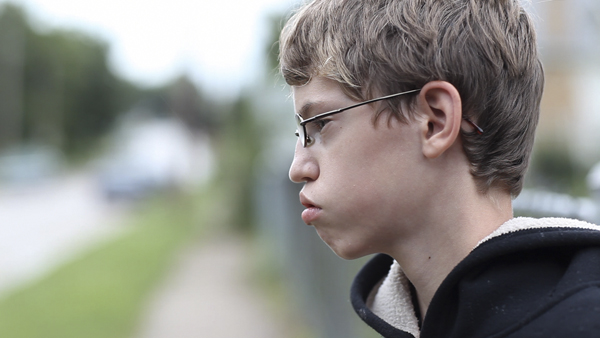
Alex Libby, 12 (The Weinstein Company)
Bully goes to the frontlines of the war on middle and high school kids who don’t fit in. The embedded filmmakers expose the battles they and their families face, survive, or, even worse, lose.
The prologue establishes that this is a life or death struggle, as the parents of Tyler Long in Murray County, Georgia, tearfully describe how they found their 17-year-old son after he hanged himself at home in October 2009. They are not only filled with inevitable grief but righteous anger that his school ignored the hostile environment around him daily. But the heart of the documentary follows 12-year-old Alex Libby through what is the most awkward time in anyone’s life—seventh grade. Worse, what seems like his annus horribilis is heartbreakingly like every other school year for him. So it is startling that his Sioux City, Iowa, school district allowed this incredibly intimate access to tout their commitment to bullying prevention when the students and administrators don’t seem to have gotten the message at all. The filmmakers capture fraught interactions in the school yard, gym, hallways, and the hell on wheels that is the school bus, blasting open a wall of silence that keeps parents in the dark and assistant principals as negligent enablers.
In interviews, the proudly out lesbian Kelby Johnson and her family in Tuttle, Oklahoma, remain determined to stay put in her school despite shunning. Her predicament was brought to the filmmakers’ attention by the producers of The Ellen DeGeneres Show, though comparatively it has been overpowered by all that’s happened with the outpouring of the “It Gets Better” campaign in the year since the documentary premiered at the Tribeca Film Festival. But her experience provides context about how words like “faggot” are wielded as weapons in these mostly homogenous, heartland rural communities of the South and Midwest. (The new Bishop Allen score with folksy guitars and banjos emphasizes how Americana these communities are.) These kids, who have a target on their backs from a young age, aren’t picked on over race or ethnicity, but because they are perceived as different. (Even Alex’s sister and mother say he looks “weird.”)
While director Lee Hirsch spends a lot of screen time on the emotional pathos of grief and guilt stricken parents, the most galling and eye-opening segments center on schools’ inaction, or worse, their blaming the victim. (As a mother, I witnessed year to year the difference intervention can make in containing bullying vs. the “kids will be kids” shrug.) When frightening footage of an assault on Alex is brought to the attention of the school and his family, a bully is called into the principal’s office only because he was caught on camera, and he blames Alex for making him feel so angry he can’t help but hit him (no further follow-up is seen). The administrator self-righteously points out to Alex that at least kids haven’t sat on his head on the bus since he complained about that last year, while another assistant principal forces a crying victim, who struck back, to forgive a smirking, obviously insincere perpetrator.
The consequences of schools’ neglect of the emotional toll of mounting verbal abuse are examined through the case of African-American 14-year-old Ja’Meya Jackson in Yazoo County, Mississippi. Her extreme response to taunts lands her in juvenile detention and a mental health facility. But at least she’s alive. The Longs organize other families to push their unresponsive Georgia school district to deal with the problem, while the Smalley family in Oklahoma channels their sorrow over the suicide of their 11-year-old son Ty into “Stand for the Silent” vigils to encourage empathy and alliances with the victims.
It isn’t clear if these tearful vigils that have spread around the country include the popular kids glimpsed in the parallel high school world of student council elections—let alone if they and/or the bullies will see this film. Certainly the MPAA isn’t encouraging them with a ludicrous scarlet “R” rating instead of the PG-13 of salacious Hollywood gore-fests, even though the victims are so mortified at the bad words hurled at them that they can only spell them out. The Weinstein Company is challenging newspaper and theater chains by releasing it unrated. My high school bully who apologized to me at our 25th reunion might see it, but I wish my middle school nemesis, whose friend request I haven’t accepted on Facebook, would take her grandchildren.






Leave A Comment